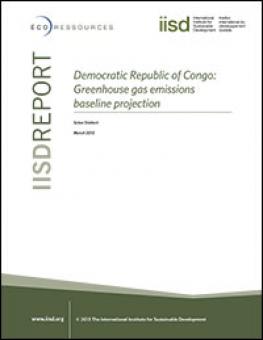
Democratic Republic of Congo: Greenhouse gas emissions baseline projection
Development of greenhouse gas emission baseline projections, or business-as-usual scenarios, are critical for the assessment of nationally appropriate mitigation actions.
These projections must be based on plausible and consistent assumptions on how different economic sectors might evolve in the absence of new policies and regulations directed at achieving greenhouse gas emission reductions.
Policy-makers can use the baseline projections to help evaluate appropriate technologies and practices to mitigate climate change and contribute to national development objectives. The main purpose of the baseline is to have a projection against which to evaluate mitigation policies and measures, but the baseline also provides a starting point to consider alternative scenarios, forecast emissions, and to measure progress towards possible targets. In addition, the process of developing baseline projections provides an independent review of the assumptions and data used to develop national emission inventories and can lead to more robust and accurate emission inventories.
In this report, a single emissions baseline projection for the Democratic Republic of Congo is generated out to 2030. It represents a conservative estimate of future emissions and considers existing climate policies and regulations. This forms the reference baseline—or business-as-usual scenario—against which it is possible to demonstrate the abatement potential of low-carbon development options. Specific methodologies, data and assumptions are presented for the seven sectors that align with United Nations Framework Convention for Climate Change guidelines: energy demand, energy supply, transportation, industrial processes, agriculture, land use, land-use change and forestry and waste. Recommendations are also made for the improvement of emission inventories.
Participating experts
You might also be interested in
December 2024 | Carbon Minefields Oil and Gas Exploration Monitor
In November 2024, 23 oil and gas exploration licences were awarded across five countries, with Russia granting the licences that account for the largest portion of embodied emissions.
Increased Support Needed to Achieve India's Clean Energy Goals
India is on track to achieve many of its 2030 clean energy goals but needs to step up government support measures to accelerate the deployment of offshore wind, electric vehicles, and green hydrogen, according to a new report.
Budgeting for Net Zero
This study estimates the cost gap for battery energy storage systems (BESSs), offshore wind, solar photovoltaic (PV), electric vehicles (EVs), and green hydrogen (GH2) to inform government support.
Artisanal and Small-Scale Mining of Critical Minerals
This report examines the potential for artisanal and small-scale mining (ASM) to take an expanded role in the global supply of critical minerals.